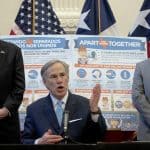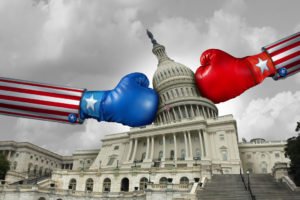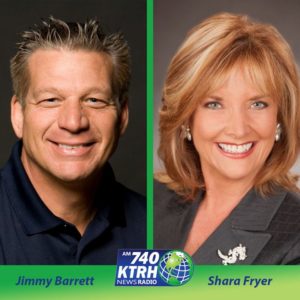The issue pits Gov. Greg Abbott, whose office has discretion over how to dole out $8 billion, against urban county judges, who are fending off smaller cities in their jurisdictions locked out of the money the governor oversees.
In Travis County, those communities include Manor, Bee Cave, Cedar Park, Leander and Pflugerville, where the mayors find themselves begging county officials for a share of federal cash.
At stake are plans in those cities to pump money into local economies, as restaurants and shops try to resuscitate their businesses.
The tension began this month after Abbott unveiled how he, in conjunction with other top officials, was going to divvy up money.
Based on its population, Texas won $11.24 billion of the $150 billion coronavirus relief package passed by Congress. Of that amount, by federal statute, $3.2 billion was sent directly to the state’s six cities and 12 counties with populations greater than 500,000.
The city of Austin is getting $170.8 million and Travis County is getting $61.1 million — or nearly $200 per person overall.
That left about $8 billion in play for state officials to work with. The governor’s office, working with Lt. Gov. Dan Patrick, House Speaker Dennis Bonnen, R-Angleton, and lawmakers on the Senate Finance and House Appropriations committees (including the Democratic vice chairs), decided to make $1.85 billion available to Texas’ 242 other counties and the cities within those counties. Relatively lightly touched by the pandemic, those areas get money at a rate of $55 per person.
The rest of the federal windfall will stay in state hands.
Large counties, Abbott and the other state officials announced May 11, “are expected to use their funds to address expenses incurred by incorporated areas with a population less than 500,000 that are located in those counties, as well as the needs of residents in unincorporated areas of those counties.”
Leaders of the large counties cried foul.
Following the money
Based on its population, Texas won $11.24 billion of the $150 billion coronavirus relief package passed by Congress. Of that amount, by federal statute, $3.2 billion was sent directly to the state’s six cities and 12 counties with populations greater than 500,000. State lawmakers decided to make $1.85 billion available to Texas’ 242 other counties and the cities within those counties. The rest of the federal windfall will stay in state hands.
Houston and Harris County, $822 million
Dallas and Dallas County, $460 million
Fort Worth and Tarrant County, $367 million
San Antonio and Bexar County, $349 million
Austin and Travis County , $232 million
Collin County, $181 million
Denton County, $155 million
Hidalgo County, $152 million
El Paso County, $146 million
Fort Bend County, $142 million
Montgomery County, $106 million
Williamson County, $93.3 million
Source: University of Texas Entrepreneurship and Community Development Clinic
In a May 12 letter to the governor, Dallas County Judge Clay Jenkins said it is “disappointing to see your administration has deliberately excluded cities in counties who did receive direct appropriation from the U.S. Treasury.”
Jenkins continued: “Please consider a more equitable distribution method and the amount of relief funds your administration has chosen to deploy during this unprecedented public health crisis.”
And May 13, Travis County Judge Sam Biscoe, joining his counterparts from 10 other large counties, asked the governor to “amend your decision to allow cities in the most populous counties who have been most impacted by COVID-19 to have the same access as other cities to these critically needed funds.”
In a response Friday, the governor and other legislative leaders wrote that the federal money “was meant to provide resources for BOTH state and local responses — not local expenses alone, as your letter implies. Texas has led the way in creating a framework to share those resources with local governments.”
According to a May 18 tally by the National League of Cities, Texas is one of 16 states allowing some smaller cities to apply for transfers of federal coronavirus money. At least 32 other states “are withholding funding from most municipal governments, including all small and rural municipalities, with no indication when, or if, funds will ever be made available.” Two states are allowing transfers to county governments but are excluding municipal governments.
The federal money is supposed to pay for necessary expenditures due to the COVID-19 pandemic and not be used as a source of revenue replacement for budgets already approved.
“It is our expectation. and we feel certain it is the expectation of county residents who live in cities within your county, that they be treated equally as citizens in the unincorporated areas of the county,” Abbott and legislative leaders wrote in their response.
“It is unreasonable to demand additional dollars be allocated locally at this time,” the letter continues. “It is our expectation that you will work with the smaller municipalities within your jurisdiction to allocate money for them in a fair and equitable manner.”
Meanwhile, the small cities are pressing county judges for a share of the federal money.
In a letter to Biscoe on Monday, the mayors of more than a dozen Travis County communities, representing 133,000 residents, asked that the county share with them more than $26.2 million of the $61 million in coronavirus relief money the county had received.
“We have eagerly worked alongside the county for months now to help ensure all of our residents are safe and well informed with regard to regulations that affect them,” they wrote in arguing for a share of the money.
The letter was signed by the mayors of Bee Cave, Briarcliff, Cedar Park, Jonestown, Lago Vista, Lakeway, Leander, Manor, Pflugerville, Point Venture, Rollingwood, San Leanna, Sunset Valley, Village of the Hills, Volente and West Lake Hills.
“We’re trying to get as much money down to the local municipality level as we can,” Manor Mayor Larry Wallace Jr. told the American-Statesman. The mayors want to shore up “vulnerabilities in emergency needs as we prepare for a second wave (of infections) or set our economies up for less of an impact once this all resolves.”
Cities like Manor, he said, don’t have the cash flow and revenue to protect families that risk evictions or crippling debt as state emergency orders on debt forgiveness and eviction suspensions cease.
“Why can’t I do a mutual aid agreement with a couple of our local restaurants?” Wallace said. “We could say, ‘You’re getting this money to provide aid for a vulnerable population.’ Not only are family members cared for, but you’re funding a business to stay open.”
Former Travis County Judge Sarah Eckhardt, who is acting as an adviser to Biscoe, said guidelines from the U.S. Department of the Treasury indicate those cities should get their “pass-through” from the state.
For now, Abbott, who has virtually full discretion on the matter and has the advantage of checking in with legislative partners, appears to be in the catbird seat.
“We have decimated our budgets,” said Eckhardt, who is running as a Democrat in a July 14 special election to replace former state Sen. Kirk Watson in an Austin-based district. “We have raked out all of the emergency reserves we have. He is having us fight among ourselves for a diminishing amount of money. But we want to be in partnership in our cities, so we are looking at ways we can work together.”
Travis County is planning to use about $10 million in small business grants and $10 million in utility assistance. Officials are still evaluating other uses for the money, Eckhardt said. County commissioners might consider asking cities to make proposals for the kinds of programs they would like to be funded using the county money.





